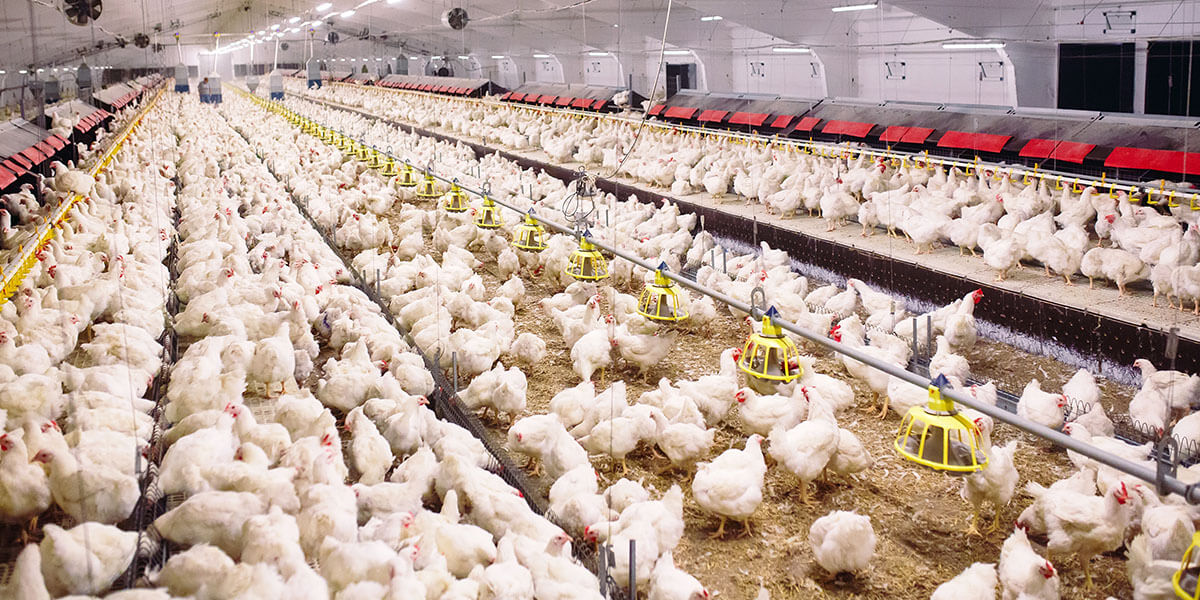Antibiotic-free animal production will require more production management, but there are effective ways to maintain animal health without using antibiotics. That’s good news for those who are trying to meet consumer market demand for meat raised without antibiotics. Animal protein producers have discovered that one of the keys when eliminating antibiotics in animal production is the inclusion of trace minerals in animal diets.
Antibiotic-Free Production Challenges
Whether antibiotics are injectable, or provided through feed, the end goal of using antibiotics is to improve animal health by interfering with the process bacteria use to infect and multiply within the animal. Without antibiotics, there’s increased potential to have more animals getting sick, which will increase treatment costs and could increase death loss. And, certainly, sick animals will have poorer performance, whether you measure that in additional biosecurity measures, rate-of-gain, overall weight gain, days to market or by egg production.
With these challenges and the absence of antibiotics, it makes sense, both economically and for overall animal wellness, to strengthen the animal’s immune system. One way to improve animal wellness and performance in the absence of antibiotics is to supplement livestock and poultry diets with trace minerals. Zinpro trace mineral research has shown that feeding performance trace minerals can help support a more robust initial immune response to potential disease challenges. Selenium, copper and zinc, in particular, each play a very important role in how white blood cells control disease-causing bacteria. A stronger immune system reduces the likelihood of needing antibiotics to maintain animal health. In fact, producers may discover that the use of antibiotics may have masked another health issue — intestinal inflammation.
Intestinal Inflammation Can Lead to Leaky Gut
The lining of the intestinal tract is comprised of a layer of epithelial cells. These cells are bound to each other by complex protein structures called “tight junctions,” and their role is to prevent bacteria, pathogens and toxins from passing through the intestinal lining and into the bloodstream. In animals, factors such as heat stress, bacteria, feed contaminants, etc., can weaken the quality of these tight junctions, leading to a syndrome called “leaky gut.”
Leaky gut allows the molecules of bacteria, pathogens and their toxins to pass in between the epithelial cells, resulting in cell damage or inflammation of the intestine. The immune system is activated – or becomes inflamed – in its efforts to kill the challenges these molecules present. An activated immune system requires significant levels of nutrients to deal with the inflammation, which means the amount of nutrients available for animal performance including muscle growth is reduced.
How Zinc Boosts Immunity and Mitigates Leaky Gut
There are two ways which zinc mitigates inflammation caused by leaky gut. First, it enhances the natural barrier in the gut and lungs by strengthening bonds between the epithelial cells in the gastrointestinal tract and respiratory system. Zinc is essential to maintaining normal cellular physiology and metabolism. This helps sustain the “tight junctions” during a challenge by bacteria and other pathogens and decreases the occurrence of leaky gut and related intestinal inflammation.
Second, zinc enhances the white blood cell population in the animal, so when a challenge does occur, the immune system can respond in a more rapid and robust manner. Zinc significantly increases the antibody titer which is triggered by vaccines. The antibody titer is a test that detects the presence of antibodies and measures the number of antibodies in the blood. This correlates to the strength of the animal’s immune response to invading microorganisms. A stronger antibody titer means a greater ability to destroy or neutralize invading microorganisms. And that helps return the animal more quickly to growing and building muscle.
Management Practices for Antibiotic-Free Production
Each species will have its own best management practices for improving the animal’s ability to fight bacteria. For example, in antibiotic-free pork production or beef production, you may use an enhanced vaccine program, which would target diseases that last showed up in your production facility. This means you’ll need to work closely with your veterinarian to effectively diagnose both subclinical and clinically diseased animals.
The same is true for antibiotic-free chicken production. Additionally, best practices specific to poultry production include:
- reducing housing populations by up to 20 percent in order to help reduce disease pressure; and
- changing the litter for each rotation of birds in order to reduce pathogens and provide better air quality.
By combining these best management practices with research-proven trace minerals from Zinpro Performance Minerals®, you should be able to attain improved animal wellness and performance, as well as improved profitability within your livestock or poultry operation, regardless of whether or not it is antibiotic-free.
To learn more about how performance trace minerals can help improve animal wellness and performance in your antibiotic-free animal production system, connect with one of our experts today.

